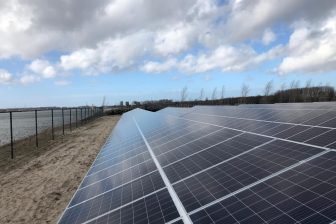Europese olieconcerns pleiten voor een uniforme CO2-heffing
2 juni 2015 – Zes grote Europese oliemaatschappijen pleiten in een open brief voor een nieuw stelsel om CO2-uitstoot te beprijzen, om zo klimaatverandering tegen te gaan. De bedrijven willen hiervoor samenwerken met de Verenigde Naties en overheden wereldwijd.
De ondertekenaars van de brief, Shell, BG, BP, Eni, Statoil en Total, willen dat op de klimaattop in Parijs afspraken worden gemaakt over de koolstofprijs. Verder wijzen de concerns op het belang van gas bij de transitie naar een duurzamer energieopwekking.
De brief van de oliebedrijven aan de VN en overheden wereldwijd
‘(…) Climate change is a critical challenge for our world. As major companies from the oil & gas sector, we recognize both the importance of the climate challenge and the importance of energy to human life and well-being. We acknowledge that the current trend of greenhouse gas emissions is in excess of what the Intergovernmental Panel on Climate Change (IPCC) says is needed to limit the temperature rise to no more than 2 degrees above pre-industrial levels. The challenge is how to meet greater energy demand with less CO2. We stand ready to play our part.
Our companies are already taking a number of actions to help limit emissions, such as growing the share of gas in our production, making energy efficiency improvements in our operations and products, providing renewable energy, investing in carbon capture and storage, and exploring new low-carbon technologies and business models. These actions are a key part of our mission to provide the greatest number of people with access to sustainable and secure energy.
For us to do more, we need governments across the world to provide us with clear, stable, long-term, ambitious policy frameworks. This would reduce uncertainty and help stimulate investments in the right low carbon technologies and the right resources at the right pace.
We believe that a price on carbon should be a key element of these frameworks. If governments act to price carbon, this discourages high carbon options and encourages the most efficient ways of reducing emissions widely, including reduced demand for the most carbon intensive fossil fuels, greater energy efficiency, the use of natural gas in place of coal, increased investment in carbon capture and storage, renewable energy, smart buildings and grids, off-grid access to energy, cleaner cars and new mobility business models and behaviors.
Our companies are already exposed to a price on carbon emissions by participating in existing carbon markets and applying ‘shadow’ carbon prices in our own businesses to test whether investments will be viable in a world where carbon has a higher price.
Yet, whatever we do to implement carbon pricing ourselves will not be sufficient or commercially sustainable unless national governments introduce carbon pricing even-handedly and eventually enable global linkage between national systems. Some economies have not yet taken this step, and this could create uncertainty about investment and disparities in the impact of policy on businesses.
Therefore, we call on governments, including at the UNFCCC negotiations in Paris and beyond to:
- introduce carbon pricing systems where they do not yet exist at the national or regional levels
- create an international framework that could eventually connect national systems.
To support progress towards these outcomes, our companies would like to open direct dialogue with the UN and willing governments. We have important areas of interest in and contributions to make to creating and implementing a workable approach to carbon pricing, including:
1. Experience. For more than a century we have provided energy to the world. We are global in reach, closely familiar with managing major projects and risks of many kinds, and well-versed in trading and logistics. As we are already users of carbon pricing systems across the world, exchange of information at international scale could help to identify the best solutions.
2. Motivation. We want to be a part of the solution and deliver energy to society sustainably for many decades to come. Like our counterparts in other industry sectors we will play a key role in implementing the measures and deploying the technologies that will lead to a lower carbon future. Low carbon business models and solutions are fragile until they reach critical size, but with linked carbon pricing systems worldwide, uncertainty would be reduced and such solutions will start to create value for business more rapidly.
3. Pragmatism. We believe our presence at the table could be helpful in designing an approach to carbon pricing that would be both practical and deliverable, as well as ambitious, efficient and effective.
4. A forum for discussion. Our companies and others have come together under the auspices of the World Economic Forum to form the Oil & Gas Climate Initiative, or are members of the International Emissions Trading Association, the World Bank or the UN Global Compact Carbon Pricing initiatives. We believe these forums may offer an appropriate ground for public-private dialogue on how to price carbon into energy.
Practically, we and our senior staff will seek to engage and share our companies’ perspectives on the roleof carbon pricing in several important settings:in our meetings with Ministers and Government representatives.
- as we attend and address conferences
- as we hold engagements with our investors
- as we conduct meetings with other stakeholders including partners, suppliers, academics and researchers
- as we hold meetings for management and staff within our businesses.
Pricing carbon obviously adds a cost to our production and our products – but carbon pricing policy frameworks will contribute to provide our businesses and their many stakeholders with a clear roadmap for future investment, a level playing field for all energy sources across geographies and a clear role in securing a more sustainable future.
We acknowledge the long-term challenge and appreciate that this will be transformative across the energy sector. Over many decades, our industry has been innovative and has been at the forefront of change. We are confident that we can build on our trajectory of innovation to meet the challenges of the future.
Each of us will copy this letter personally to key contacts among investors, governments, civil society and our staff.
Signatories:
BG Group plc – Mr. Helge Lund
BP plc – Mr. Bob Dudley
Eni S.p.A. – Mr. Claudio Descalzi
Royal Dutch Shell plc – Mr. Ben van Beurden
Statoil ASA – Mr. Eldar Saetre
Total S.A. – Mr. Patrick Pouyanné (…)’
Uit een bericht van UNFCCC
‘(…) Ms Figueres has said that the oil and gas industry must be a major part of the solution to climate change by harnessing its power and technical expertise to cut back emissions much faster.
World Bank Group President Jim Yong Kim later issued a statement responding to the letter. “I welcome the call today for a price on carbon by six of the world’s major oil and gas companies. This is an important step in global efforts to drive the world’s economy toward a low-carbon, resilient future and lower climate risks,” he said. (…)’
Uit een bericht van de NOS
‘(…) De grote Amerikaanse spelers Chevron en ExxonMobil hebben al laten weten niet mee te doen aan een dergelijk gezamenlijk initiatief waar hun Europese concurrenten nu mee komen. De topman van ExxonMobil liet op de jaarlijkse aandeelhoudersvergadering weten “niet onoprecht” te willen zijn over klimaatpolitiek en “niet net te willen doen alsof.” (…)’
Bronnen
Shell, 1 juni 2015: Oil and gas majors call for carbon pricing
UNFCCC, 1 juni 2015: Six Oil Majors Say: We Will Act Faster with Stronger Carbon Pricing
EurActiv, 1 juni 2015: Europe’s energy big six say gas must help in the fight against climate change
NRC, 1 juni 2015: Oliebedrijven willen serieuze prijs voor CO2
Nu.nl, 1 juni 2015: Olieconcerns willen uniforme CO2-heffing
NOS, 1 juni 2015: Europese olieconcerns willen minder CO2-uitstoot



